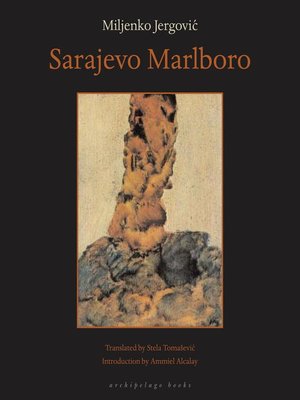
Sign up to save your library
With an OverDrive account, you can save your favorite libraries for at-a-glance information about availability. Find out more about OverDrive accounts.
Find this title in Libby, the library reading app by OverDrive.



Search for a digital library with this title
Title found at these libraries:
| Library Name | Distance |
|---|---|
| Loading... |
One of the 25 Books That Inspired the World (1989–2014), World Literature Today
A remarkable and bracing collection of “classic anti-war writing” from a Croatian writer whose piercing prose recalls Kurt Vonnegut and Aleksander Hemon (Richard Flanagan, Booker Prize–winning author)
Miljenko Jergović’s remarkable debut collection of stories, Sarajevo Marlboro, earned him wide acclaim throughout Europe. In “melancholy, dreamlike” prose, the stories in Sarajevo Marlboro “recall Alan Lightman's Einstein's Dreams and Italo Calvino's Invisible Cities, but Jergovic’s book is the strongest of the three” (Maud Newton). Croatian by birth, Jergović spent his childhood in Sarajevo and chose to remain there throughout most of the war. These stories are distinctly of the material world, and they are shaped by Jergović’s deeply personal vision, subterranean humor, and a razor-sharp understanding of the fate of the city’s young Muslims, Croats, and Serbs—the minute details of their interior lives in the foreground, the killing zone in the background.
A remarkable and bracing collection of “classic anti-war writing” from a Croatian writer whose piercing prose recalls Kurt Vonnegut and Aleksander Hemon (Richard Flanagan, Booker Prize–winning author)
Miljenko Jergović’s remarkable debut collection of stories, Sarajevo Marlboro, earned him wide acclaim throughout Europe. In “melancholy, dreamlike” prose, the stories in Sarajevo Marlboro “recall Alan Lightman's Einstein's Dreams and Italo Calvino's Invisible Cities, but Jergovic’s book is the strongest of the three” (Maud Newton). Croatian by birth, Jergović spent his childhood in Sarajevo and chose to remain there throughout most of the war. These stories are distinctly of the material world, and they are shaped by Jergović’s deeply personal vision, subterranean humor, and a razor-sharp understanding of the fate of the city’s young Muslims, Croats, and Serbs—the minute details of their interior lives in the foreground, the killing zone in the background.







